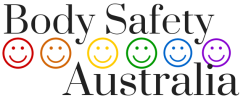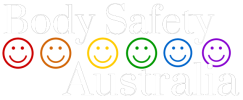FAQs
Prevention education at its heart is education that is implemented before violence occurs and aims to reduce the likelihood of people using violence in the future. Prevention education is a commonly accepted practice for lots of issues we face, such as skin cancer! Campaigns around sun safety and the acceptance of sunscreen importance, are prevention education messages. They’re teaching us things that we can do to help prevent the problem.
Body Safety Australia does this by addressing the root cause of the violence; through educating children about respectful relationships, consent, bodily autonomy and help-seeking behaviours.
It can be very difficult to wrap our heads around how teaching children to ask for hugs can somehow prevent child sexual abuse, but that is the incredible power of prevention education.
Comprehensive protective behaviours and Body Safety Education leads adults in championing children’s rights, whilst empowering children and providing relationship skills that will benefit them for life.
At Body Safety Australia, we teach inclusive, strength-based body safety education. We believe it is never a child or victim’s responsibility to protect themselves from abuse. We support communities in preventing abuse by creating generational change where sexual and gendered violence is no longer normalised.
Culture change occurs when educators, parents and carers are supported in modelling and teaching consent so that this becomes the standard that young people uphold as they become adults. Children are taught not only their right to bodily autonomy, but their responsibility to respect the bodies and feelings of their peers.
While we know violence against children is a huge issue in Australia, often it isn’t discussed openly within communities.
Teaching children Body Safety skills is the same as teaching them about healthy eating. While they are small, you are making all their food choices for them but as they grow you want them to have the skills to understand about nutrition. The earlier you start, the more confident they will be.
Sadly, in 90% of cases, the perpetrator of childhood sexual abuse will be either a family member or someone known and trusted by the family. While we don’t want to believe this of people we care for, brushing up on prevention education can save a child from harm in the event that there is an abuser within your community.
The best practice in this space is involving the whole community to better protect our young people. So having this education doesn’t just protect your children, but also all the children in your community.
The word consent is often used in media to talk about sex and sexual crimes. But consent is something we all utilise in our everyday life in almost all situations!
So, when we get asked for a hug with our grandma, that’s about consent. When we are getting children to hold our hands to cross the road, that’s about consent. When we play tickling games with our children, that’s also about consent. Consent is simply about giving permission; permission to touch our bodies in a hug, permission to help us wipe our face or put sunscreen on, permission for a dentist to check our teeth.
So, while yes, consent is a hugely important part of sexual safety, its also about all other moments of permission.
We understand that every community within Australia will have different unique needs around children’s safety. We have extensive experience working with children and young people within faith-based schools, special schools, LGBTQIA+ communities and CALD communities. This work can’t be done with a one size fits all approach, so we work closely with the school or centre to best meet the diverse needs within the community.
Yes, we do! While our physical base is in Melbourne, we travel all over Australia delivering workshops and professional development. There is a travel cost, however this can be shared by multiple centres or schools in the area. We also have some online options for workshops and training depending on the program. Feel free to get in touch so we can plan how best to get to you! Contact Us
Yes, they do!
Increasingly, internet-connected devices are used as a grooming tool. Our team ensure that our programs are responsive to the latest developments in technology and remain relevant to children every year.
For this please visit our booking’s enquiry form for schools/educators.

